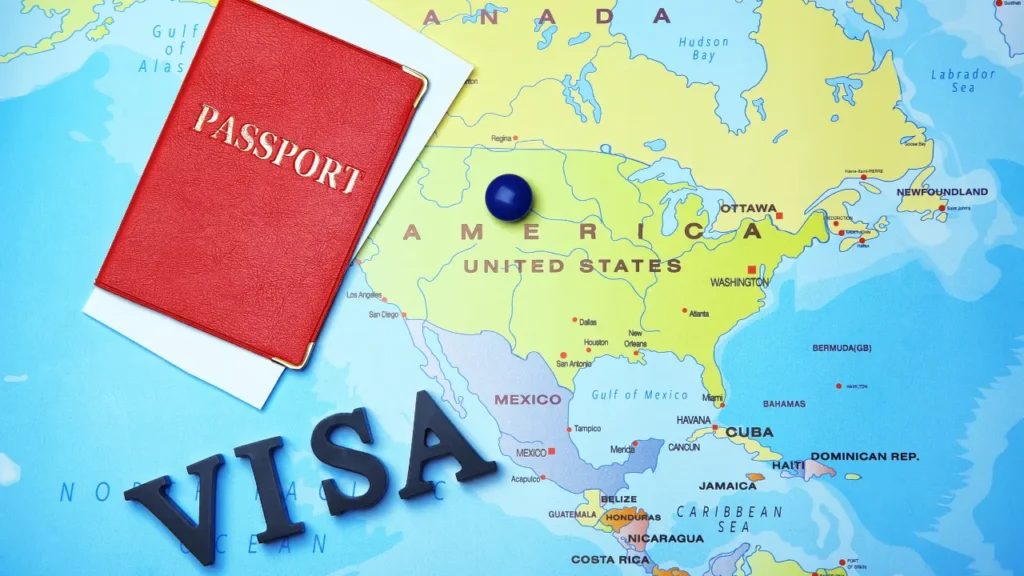A US citizen can stay in Bali for up to 30 days without a visa. This period can be extended once for another 30 days while in Indonesia.
As an archipelago known for its stunning beaches, lush rice terraces, and vibrant culture, Bali has become a top destination for travelers from around the world, including those from the United States. With its warm climate and welcoming community, Bali offers a compelling mix of adventure, relaxation, and cultural experiences.
US citizens planning a trip to this Indonesian paradise should be aware of the visa requirements to ensure their stay is both enjoyable and compliant with local laws. Whether you’re visiting for the surf, the temples, or the terraces, understanding the duration of your permitted stay is essential for a hassle-free Balinese holiday.

Table of Contents
Toggle- Understand Visa Requirements
- Staying In Bali Without A Visa
- Exploring Visa Extension Options
- Long-term Stays: Social & Cultural Visas
- Converting To Temporary Residency
- Overstay Penalties And Consequences
- Extenuating Circumstances And Overstay
- Preparing For Extended Stays
- Embracing Balinese Culture Respectfully
- Frequently Asked Questions Of How Long Can A US Citizen Stay In Bali
- Conclusion
Understand Visa Requirements
US citizens enjoy the benefit of visa-free entry to Bali for short stays. This ease of access allows stays of up to 30 days for tourism purposes. No prior visa arrangement is required for these short visits – a convenience that makes it simpler for Americans to experience Bali’s splendor.
Should a longer sojourn be desired, travelers have the option to obtain a tourist visa before arrival, which may be extendable for an additional 30 days. Visitors should note that such an extension requires an application to Indonesian immigration authorities and cannot be guaranteed. It is essential to respect the maximum stay regulations to avoid overstay penalties.
| Type of Visa | Duration | Extension Option |
|---|---|---|
| Visa-free Entry | 30 days | No |
| Extendable Tourist Visa | 30 days + 30-day extension | Yes |
| Non-Extendable Tourist Visa | 30 days | No |
Attaining the non-extendable visa involves less paperwork but also means adhering strictly to the 30-day limit. Complying with these guidelines ensures a hassle-free travel experience in Bali.
Staying In Bali Without A Visa
US citizens are granted a 30-day visa-free stay upon arrival in Bali. This period is non-extendable and is limited strictly to vacation, leisure, or cultural visits. Engaging in business activities or employment is prohibited during this visa-free period. It is crucial for
tourists to respect the 30-day limit, as overstaying can result in fines, legal issues, or even deportation. The Indonesian government imposes a fine of IDR 1 million per day for overstaying, and repeated or lengthy overstays can lead to more severe penalties.
Exploring Visa Extension Options
US citizens have the option to extend their stay in Bali through a tourist visa extension process. The initial tourist visa is valid for 30 days, and with an extension, travelers can enjoy an additional 30 days in this tropical paradise. It’s crucial to start the extension process before the current visa expires, ideally about seven days prior, to ensure a smooth continuation of your stay without any legal issues.
To initiate the visa extension process, you’ll need to visit the immigration office and submit a visa extension application form. Along with the form, the following documents are required:
- A passport with a minimum validity of six months
- A photocopy of the passport page with the original visa
- Proof of return flight or onward ticket
- Payment for the visa extension fee
Ensure that all documents are complete and accurate to avoid any delays. Mind that missing the deadline can result in a fine or other penalties. Once submitted, the process may take several days, so plan accordingly to ensure a pleasant extended stay in Bali.
Long-term Stays: Social & Cultural Visas
U.S. citizens interested in experiencing Bali’s culture for an extended period can apply for a Social and Cultural Visa (Sosbud Visa). This visa is designed for those engaging in social, cultural, educational, or familial exchanges with Indonesian citizens.
| Eligibility Criteria | Stay Duration | Extension Options |
|---|---|---|
| Intention to participate in social/cultural activities | Initial 60 days | Up to 4 times for 30 days each |
| Letter of invitation from an Indonesian sponsor | Total maximum of 180 days | |
| Evidence of sufficient funds |
To secure a Sosbud Visa, applicants must submit the necessary documents to an Indonesian embassy or consulate. This process includes providing a completed application form, a copy of a passport with 6 months validity, proof of a return ticket or onward journey, and the sponsor letter. After fulfilling these requirements, U.S. citizens can immerse themselves in Balinese culture while forming meaningful connections within local communities.
Converting To Temporary Residency
US citizens desiring to extend their stay in Bali can convert their status to temporary residency by obtaining an ITAS (Temporary Stay Permit).
The eligibility criteria for ITAS are multifaceted. Applicants must either be spouses of Indonesian citizens, expatriates working in Indonesia, foreign investors, or retirees. Documentation such as a valid passport, sponsorship from an Indonesian resident, and proof of financial sustainability are typically required for the application process.
Applying for ITAS involves several steps, beginning with the submission of a formal application to the Indonesian Immigration authorities accompanied by the necessary documentation. Following this, an interview and biometric data collection may ensue.
The validity period for ITAS ranges from six months to two years, depending on the nature of the stay and it can be renewed. It is crucial to initiate the renewal procedure at least 30 days before the permit’s expiry date to avoid overstay penalties.
Overstay Penalties And Consequences
US citizens venturing to Bali are enchanted by its pristine beaches and rich culture. Yet, it is crucial to adhere to the visa regulations to avoid consequences. Notably, any stay beyond the stipulated period incurs a daily fine. Presently, the amount levied for each day of overstay is approximately $70 USD.
The repercussions of overstaying include not just financial penalties; the legal implications also extend to potential immigration blacklisting, harming future travel plans. Authorities hold the discretion to escalate matters, leading to deportation for violators.
Individuals intending to extend their stay must consult with immigration officials to resolve visa issues. This proactive approach is invariably advantageous, mitigating the risk of hasty resolution processes and deportation risks as a result of overstay violations.
Extenuating Circumstances And Overstay
Us citizens visiting Bali should remain vigilant regarding extenuating circumstances that could impact their allowed duration of stay. Emergencies like natural disasters, political unrest, or personal medical issues may necessitate an extension of stay or result in an unintentional overstay.
In such cases, the first course of action should be to contact the nearest US Embassy or Consulate. These entities can provide critical guidance and assistance. They facilitate communication with local authorities and provide information on overstay procedures. Documentation proving the nature of the emergency, such as medical reports or official notices, should be prepared as it can be pivotal when dealing with Balinese immigration.
It’s important to note that overstaying without notice can lead to fines or other legal complications. Proactive steps toward resolution are always recommended.
Preparing For Extended Stays
Financial preparation for a long stay in Bali is crucial. Visitors should ensure they have adequate funds to cover their expenses without the need to work locally, as Indonesian regulations restrict foreign employment. It’s essential to have a budget that accounts for accommodation, food, transportation, and leisure activities.
Regarding accommodation and lifestyle planning, options range from budget hostels to high-end villas. Factors such as proximity to amenities, the expat community, and lifestyle preferences will influence the decision. Researching areas like Ubud for culture, Seminyak for nightlife, or Canggu for a blend of both is advised.
Ensuring access to health insurance and medical care is paramount for expatriates. Bali has a range of healthcare facilities, from local clinics to international hospitals. Expatriates should secure health insurance that offers comprehensive coverage, including evacuation in case of serious illness or injury.
Embracing Balinese Culture Respectfully
Grasping the intricate fabric of Bali’s local traditions and customs is crucial for U.S. citizens planning an extended stay. This includes embracing religious ceremonies, dress codes, and societal norms. By showing reverence for the Balinese way of life, visitors demonstrate respect and gain deeper insights into the island’s culture.
Engagement with the Balinese community goes beyond surface-level interactions. It involves participating in local events and possibly picking up some basics of the Indonesian language, Bahasa Indonesia. This not only enhances the travel experience but also fosters mutual respect and understanding between visitors and locals.
Respectful behavior as an expatriate extends to abiding by Indonesia’s legal framework, which outlines specific visa requirements and lengths of stay. Compliance with these regulations, coupled with courteous engagement in local practices, underscores the importance of respectful coexistence in Bali’s vibrant society.
Frequently Asked Questions Of How Long Can A US Citizen Stay In Bali
Can I Stay In Bali For 6 Months?
Yes, you can stay in Bali for 6 months with a proper visa, like a multiple-entry or social/cultural visit visa which you can extend monthly. Always ensure your visa aligns with the duration of your stay.
How Long Can You Stay In Bali As American?
Americans can stay in Bali for up to 30 days without a visa. For longer stays, a visa extension or a different visa type is required.
Can A Us Citizen Live In Bali?
Yes, a US citizen can live in Bali with the appropriate visa or residency permit, such as a tourist visa or retirement visa, adhering to Indonesian laws.
Do US Citizens Need A Visa For Bali?
US citizens can visit Bali for up to 30 days without a visa under the Visa Exemption Rule. For longer stays, a visa is required.
Conclusion
Wrapping up, US citizens can relish extended stays in Bali with proper planning. A stay of up to 30 days is granted visa-free, while various visa options can extend this period. Always remember to consult the latest regulations to ensure a hassle-free Balinese adventure.
Safe travels and enjoy the Island of the Gods!



